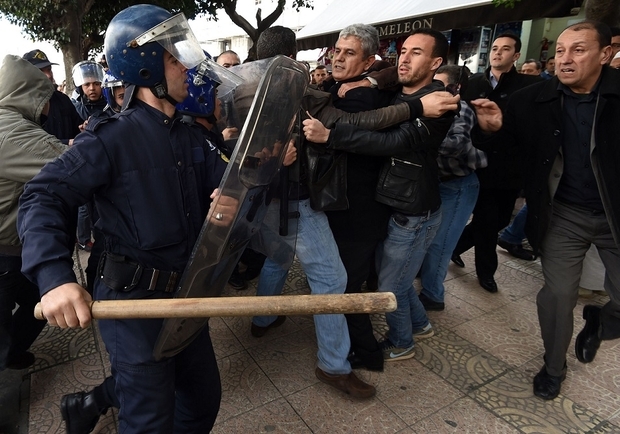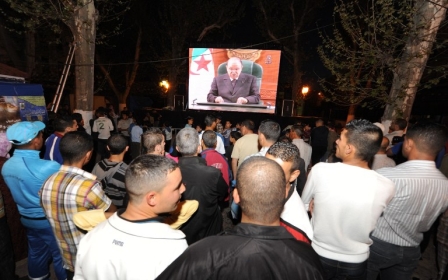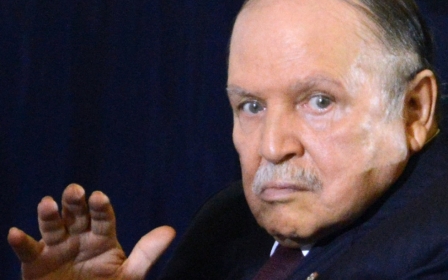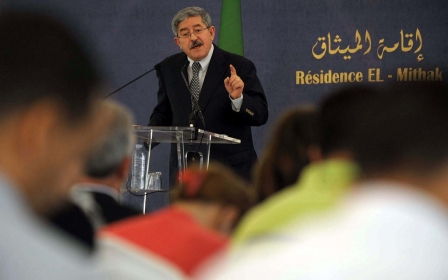From journalists to generals, Algeria cracks down on dissent

ALGIERS - Journalist Hassan Bouras was arrested on 2 October, 2015 for speaking out on Al Magharibia, the London-based Algerian television channel critical of the government.
Charged with "contempt of a state institution" and "incitement to take up arms against the state’s authority," Bouras has been accused of serving the cause of militant Islamists.
For the past three months, the journalist, who is also an activist with the Algerian League for the Defence of Human Rights and a member of the Front du Refus (Rejection Front), a coalition against the use of fracking to extract shale gas in Algeria, has been in jail waiting for a trial date to be set.
Amnesty International fears that the current proceedings against Bouras "are aiming to silence him for his dissenting views," especially since Bouras is "renowned for his efforts to expose corruption and other alleged abuses attributed to state officials," the human rights advocate said in a statement.
Bouras’s case is not isolated. Environmental activist Okacha Mehdi, who has also been charged with "contempt of a state institution,” was supposed to stand trial on 21 December, but the trial was postponed.
Mehdi, a member of the jobless people’s movement of El Oued, a small town in south-western Algeria near the Libyan border, was arrested on 25 November in the cybercafé where he used to work.
The night before he had posted photos showing police officers in a field loading cauliflower in their car. The photo, which went viral on social media, was meant to be satirical, but it was deemed an insult to the police.
Security forces searched the room where he lived at his parents’ home and according to Amnesty International, pressured him during an interrogation to provide his Facebook ID.
Mehdi and the prosecution have appealed the charges against him.
Phone threats
While the economic crisis related to the fall of oil revenues has caused political and social tensions, the Algerian authorities are showing increasing intolerance towards criticism, already under attack since the start of President Abdelaziz Bouteflika’s fourth term in April 2014.
Last May, a local court acquitted cartoonist Tahar Djehiche on charges of insulting the president and inciting mobs. Djehiche had drawn a cartoon showing Bouteflika at the bottom of an hourglass, about to be buried by sand from Ain Salah, a village where protesters had rejected fracking by the state-owned company Sonatrach.
However, Algeria's judicial system does not bar double jeopardy, and in November another court sentenced him on appeal to six months in prison and a fine of 500,000 dinars.
A month before Djehiche's sentencing, police in Algeria's western region of Tlemcen arrested and interrogated Zoulikha Blarbi, who had shared a photo montage on social media depicting Bouteflika as a sultan surrounded by a harem of government proponents.
There is also tightening control on politicians: last December, MPs who wanted to hold a press conference to challenge the 2016 Finance Act’s forced vote were abused by security forces. Even more surprising, the economist Abderrahmane Mebtoul said that the finance minister, Abderrahmane Benkhalfa, had phoned him to tell him he would be in trouble if he did not put an immediate end to criticisms of the minister’s policy.
Even the military has had its share of repression. General Hassan, former head of counter-terrorism, was sentenced to five years in prison for "non-compliance with instructions" and "destruction of military documents".
General Medjdoub, a former head of the presidential guard was also found guilty of "negligence" and "breach of military rules" and sentenced to three years in prison.
The lawyers of the retired general Hocine Benhadid, who has been been detained since September after criticising the army's chief of staff, say they are concerned about his fate. He is still waiting for a trial date.
‘What is happening in the country is frightening’
Hassina Oussedik, director of Amnesty International’s chapter in Algeria, says the attacks on freedom of expression have been "constant".
"In 2015, not a month has passed without witnessing cases of people being oppressed as they try to express themselves peacefully. The authorities rely on poorly formulated or ambiguous laws to arrest people," she told Middle East Eye.
"They use provisions of the penal code that criminalise 'contempt', 'insult' or 'defamation' aimed against representatives of the state and other institutions in order to restrict freedom of expression, including humour, expression on the internet and on the street."
In a statement in December, Amnesty stressed that the right to free and peaceful assembly should allow for peaceful demonstrations without prior permission, gatherings that the government now defines as "unarmed crowds".
The Algerian League for the Defence of Human Rights, which presented its annual report on the situation in Algeria in December said: "The Algerian system wanted to maintain the illusion of a change when the reality is marked by the continuity of repression, violations of civil liberties and human rights. Algerians who claim that their civil, economic, political, social and cultural rights should be respected are subject to discrimination and arrests."
"Last September, a security services official explicitly told his men that street movements and ‘outbursts’ could no longer be tolerated. Even if that involves the use of batons against journalists covering these events," an intelligence officer said to MEE.
"In general, it is increasingly difficult for civil, independent and autonomous society to express itself," Djilali Hadjadj, spokesperson of the Algerian Association for the Fight Against Corruption, told MEE.
"In our case in particular, it has become practically impossible to speak of proven corruption affairs [such as the scandal at the national oil company, Sonatrach, in which several executives are accused of corruption] or those [affairs] still unknown to the public, otherwise we would be subject to retaliation.
"When we are approached by the so-called 'whistleblowers' [employees, civil servants, etc] that warn us of corruption cases, we must dissuade them from making any denunciation because they are not aware of the risks. They can either lose their job - which is not the most troubling - or fall into the hands of the security services. Specifically, this means: an arrest warrant, being subjected to intimidation of all kinds, and referral to a judge or prosecutor."
The situation gets more complicated when the activists or even journalists are located in areas outside of Algiers and immediate media coverage, Hadjad added.
"The activists, journalists and even opposition politicians are completely isolated: what is going on inside the country is frightening."
Unable to open an account
For civil society organisations, this situation is not new. Crackdowns on the groups hardened during Bouteflika's third term (2009-2014) and more specifically following the "Arab Spring", when the government faced increasingly energetic social protests, spilling over from urban centres to the country's interior, including the "quiet south" that had been spared the anger of the streets until then.
At this point, the government realised it was necessary to silence opposition within its ranks. Not only were the police reinforced with equipment and men, but more powers were given to the army: under a 2011 decree, the National Popular Army (ANP) received full powers in the fight against "subversion," a term broad enough to include all forms of dissent.
In 2012, the government made reforms to laws governing organisations that critics say gave the Ministry of the Interior even more power.
Mustapha Atoui, founder of the Algerian Association for Human Rights, has had first hand experience with the reformed laws.
"Seventeen months ago, we submitted our dossier for an application for approval from the Ministry of Interior [a procedure imposed by the law]," he explained to MEE.
"This is the authorities’ policy: they tolerate associations, but do not deliver their approval to operate. But without authorisation, it is impossible to open an account and, therefore, receive money. So, after six months, the association closes."
Atoui said he had also noticed a clamping down on civil society activities over the past year.
In 2014, his association held a sit-in outside the Ministry of Interior on the International Day of Human Rights. They were untouched by the police.
But last December, many of the same protesters, joined by members of the SOS Disappeared association, which brings together families of people who were kidnapped by the security services during the 1990s, were all arrested.
"They took us to the police station at 10:30am and released us at 4pm. If they have not beaten us, it is because we have complied," he said.
These restrictions also impact foreign foundations and NGOs in Algeria, such as the German NGO Friedrich Ebert Foundation. After organising a meeting in which Algerian experts criticised the country's agricultural policy, the foundation was forced to freeze its activities when the Algerian government pulled its authorisation.
‘Naive manipulated people’
But an Algerian police officer, in charge of monitoring public demonstrations, said claims of repression were excessive and defended his activities.
"Repression? Dictatorship? Censorship? All of this is much exaggerated and is far from the truth," he told MEE. "If we did not do our job of monitoring and surveillance, Islamists and terrorists would feel omnipotent. In the 90s, this led us to chaos! Is it normal to insult the state, the president, the police or the army with impunity?"
A former minister also defends the state’s repressive policy: "Newspapers, with their criticisms and caricatures that spare no one, even the president and the army chief, aren’t they free? But the law will remain strict against those who attack the institutions and the nation; we are not a gang of criminals who must be denounced all the time. We are servants of the state and those who criticise the government are attacking Algeria."
In the former minister's view, the majority of social opposition movements, jobless in the south, anti-shale gas activists, subversive artists and independent publishers, are simply “naive people manipulated by forces hostile to Algeria and its government’s patriotic choices".
To preserve the "unity of Algeria", some observers argue that government officials have become zealous advocates of repression. The most vocal of these is Minister of Communications Hamid Grine, described by the Workers Party leader Louisa Hanoune as the “propaganda minister”.
Regularly, the minister threatens journalists, independent media, foreign press correspondents and activists on social media in the name of "ethics". He imposed the closure of two private TV channels, Atlas TV and El Watan El Djazairia TV, and publicly refused to grant accreditation to foreign press correspondents, including a journalist from the London-based daily Asharq Al Awsat, demanding that they "toe the line".
In December, the minister asked journalists to "be careful with what they post on social media networks," a member of the union of journalists told MEE.
In recent months, the minister has encouraged journalists to sign up for "professional press cards" issued in compliance with his own criteria and which also secure housing and transportation privileges.
The union member said the cards enable the minister to ensure "the allegiance of a very precarious profession; it is a form of masked blackmail."
Translation from French (original) by Ali Saad.
New MEE newsletter: Jerusalem Dispatch
Sign up to get the latest insights and analysis on Israel-Palestine, alongside Turkey Unpacked and other MEE newsletters
Middle East Eye delivers independent and unrivalled coverage and analysis of the Middle East, North Africa and beyond. To learn more about republishing this content and the associated fees, please fill out this form. More about MEE can be found here.




